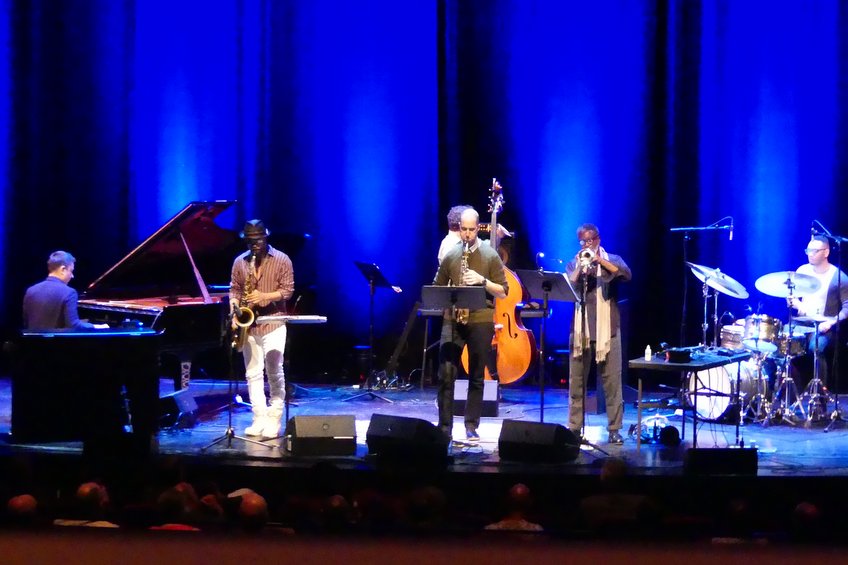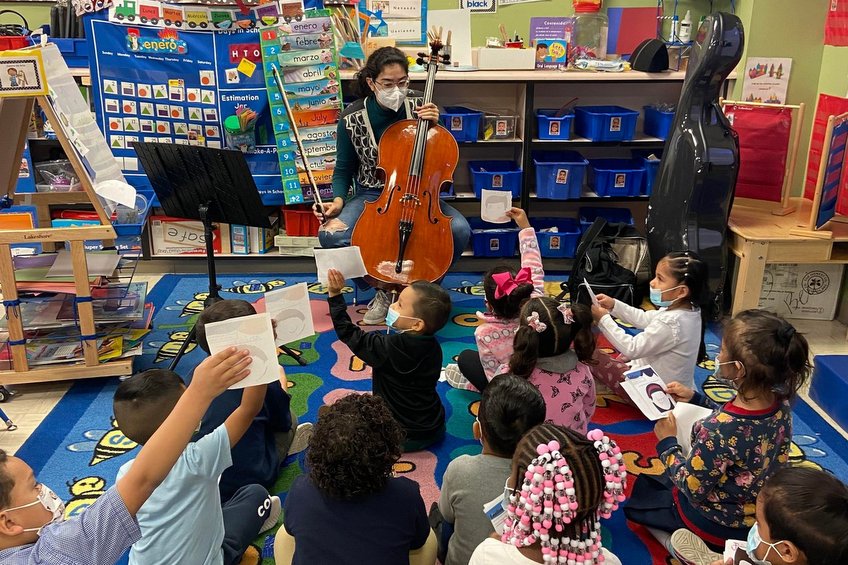DACAMERA Music Encounters
Music Encounters is a DACAMERA Education Initiative that brings classical music and jazz to students, just feet from their desks. The mission of the program is to establish creative learning environments for the core-curricular subjects, in line with national and state academic standards, by promoting collaboration between artists, students, and classroom teachers. DACAMERA brings years of experience working with schools in the Houston Independent School District, surrounding school districts, and various charter schools in the greater-Houston area.
DACAMERA Young Artists work in close collaboration with educators to connect music with the content students are learning in school. Research demonstrates a positive correlation between arts-integrated instruction and greater retention and classroom engagement. Students are able to think more critically and communicate more creatively, are more willing to take risks in learning, and are inspired to pursue further educational opportunities outside of the classroom.
DACAMERA actively works in coordination with teachers in order to develop lessons on a wide variety of topics and are eager to modify existing lessons or create new lessons. Each lesson is adaptable to different grade levels and is differentiated to meet the unique needs and teaching styles of each partner classroom.
In addition to working with a variety of public and charter schools across the Houston community, DACAMERA provides Music Encounters to students with neurological differences in HISD’s TREK (Transition Ready with Essential Knowledge) programs and at The HUB Houston. DACAMERA Young Artists participate in a year-long residency program that brings musicians into classrooms in activities encouraging behavior control, emotional awareness, interacting with your environment and self-expression. Young Artists develop activities that range from song and storytelling projects, to creative writing projects that encourage students to write and perform their own stories, illustrating skills such as brainstorming and how to collaborate and compromise by working as a group to create an original work.
DACAMERA’s work with HISD’s TREK programs and The HUB Houston are supported by the Texas Commission on the Arts – Arts Respond.
For more information, please contact Ellie Parker, Director of Education and Community Initiatives, at eparker@dacamera.com or 713-524-7601.
Sample Music Encounters Lessons
Science Lesson – “Butterfly Ballet”
- Topic: Insect Lifecycle (easily adapted to the Plant Lifecycle
- Audience: Lower Elementary
- Students learn about the lifecycle of Monarch butterflies and connect the different stages to the acts in a ballet. Students create and improvise their own ballet to represent the four different stages of the insect lifecycle while guest musicians play accompanying music.
Reading Lesson – The Very Hungry Caterpillar
- Topic: Telling Stories Through Music (Retelling & Sequencing)
- Audience: Lower Elementary
- Students learn about composers and how music can enhance a story as they listen to a musical version of “The Very Hungry Caterpillar.” The lesson culminates with students collaborating in small groups to create a “sound story” of their own using only body percussion to retell the story and the different stages of the Hungry Caterpillar’s lifecycle.
Language Arts Lesson – Empathy and the Big Bad Wolf
- Topic: Social Skills/Empathy and Creative Writing
- Audience: Lower Elementary
- Students learn about archetypes and identify both heros and villians in well-known stories and fables. A solo double-bassist performs Jon Deak’s BB Wolf featuring narration from the Big Bad Wolf’s point of view. The students discover that BB Wolf was simply misunderstood and has been mistakenly cast as the bad guy. They learn about empathy and the importance of imagining oneself in someone else’s shoes. Students then work together in small groups to rewrite the story of “Goldilocks and the Three Bears” told from the perspective of Goldilocks.
Language Arts Lesson – Greek Odes
- Topic: Poetry
- Audience: Lower & Upper Elementary
- Students learn about ancient Greek culture and the form of the traditional Greek ode. They are introduced to the harp and make observations about the similarities and differences between the modern harp and the ancient Greek lyre. Students work independently to create an original poem, following the form of the Greek ode. At the end of class, students have the opportunity to recite their ode for the class accompanied by the “lyre.”
Science Lesson – “The Science of Sound”
- Topic: Forms of Energy
- Audience: Lower & Upper Elementary
- Description: Students learn about the different forms of energy with a focus on sound energy and sound traveling as vibrations. They hear, see, and feel the sound vibrations of a variety of instruments, both traditional and non-traditional.
Language Arts Lesson – “Japanese Haiku”
- Topic: Poetry
- Audience: Lower & Upper Elementary
- Description: Students learn about Japanese culture and its unique connection to nature. They examine several examples of haiku and work independently to create their own, following the traditional model. Students are introduced to Japanese folksongs and are given the opportunity to compose a pentatonic melody and counter-melody to accompany their haiku.
Language Arts Lesson – “A Guide to Cuban Clave”
- Topic: Procedural Writing
- Audience: Upper Elementary
- Description: Students learn about procedural writing and how to add personal voice to writing assignments. Students are given a brief introduction into Cuban culture and popular music and are taught how to clap son clave while the Da Camera artist plays a timbale solo. Students then write a step-by-step guide for clapping son clave through pre-writing, writing, and revising.
Social Studies Lesson – “Decoding Spirituals”
- Topic: African-American Spirituals & Black History Month
- Audience: Upper Elementary
- Description: Students are given the opportunity to decode the hidden meanings and messages in traditional African-American spirituals. Spirituals are introduced as a uniquely American folksong tradition originating during the times of slavery. They were a means for slaves to express their deep sorrow and hope for freedom as well as a means to communicate without their masters’ knowledge. Using helpful clues, the students work in groups to decode the underlying and hidden meaning of lyrics from well-known spirituals and share their findings to the class.





